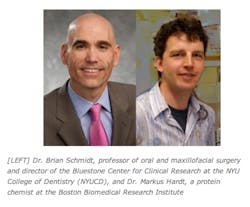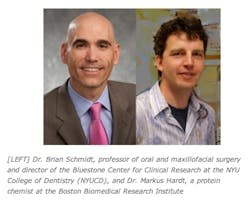NYU College of Dentistry's Dr. Brian L. Schmidt and Boston Biomedical Research Institute's Dr. Markus Hardt share NIH grant to collaborate with informationists
The National Institute of Dental and Craniofacial Research (NIDCR), part of the National Institutes of Health (NIH), has awarded a joint administrative supplement grant to Dr. Brian Schmidt, professor of oral and maxillofacial surgery and director of the Bluestone Center for Clinical Research at the NYU College of Dentistry (NYUCD), and Dr. Markus Hardt, a protein chemist at the Boston Biomedical Research Institute, to collaborate with informationists at the NYU Health Sciences Libraries in their study of the role of the molecular mechanisms of cancer pain in general and oral cancer pain in particular. Informationists are medical librarians who provide in-depth research and knowledge management services to clinical or biomedical research teams. While scientific literature has become increasingly easy to access through computer-based systems, the vast amounts of information available, coupled with the increasing complexity of library systems, frequently prevent researchers from effectively accessing the required data. This has led to a vast amount of relevant literature going unnoticed, which has negatively affected patient care as well as creativity and productivity in research Informationists use data management systems to bridge the gap between available scientific information and relevant scientific information. The grant builds on a $1.25 million, five-year NIDCR parent grant awarded to Drs. Schmidt and Hardt in 2010 to spur the development of more sophisticated analgesics (pain medications) to alleviate the pain that is so often manifested in patients with oral cancer.
“Oral cancer is a logical place to start when seeking clues about cancer pain,” Dr. Schmidt said. “To begin, oral cancer is very painful. In fact, pain is the most common presenting symptom associated with this cancer. Secondly, oral cancer is painful at the primary site, not just at sites of metastasis as in the case of all other cancers. Lastly, the primary site of the oral cancer is readily accessible, enabling us to directly sample the cancer microenvironment.” The scope and complexity of Dr. Schmidt’s and Dr. Hardt’s project offers a prime example of the pivotal role of informationists in conducting research in today’s world. The project involves 10 scientific collaborators from New York and Boston working to transfer complex data files, manuscripts, specimens, and citations between the New York City and Boston laboratories. The informationists will streamline this process by developing Web-based systems to enable the researchers to efficiently share data and citations, and automated literature searching processes to quickly and effectively identify and elucidate the role of specific molecular mechanisms — proteases and peptides — in cancer pain, thereby allowing them to focus on the most relevant peptide and protease candidates for drug development. According to Aileen McCrillis, a research librarian at the NYU Health Sciences Libraries and a member of the team of informationists joining the NYUCD-Boston research team, an informationist’s role is going to gain importance in the coming years as data management systems become more complex. “Informationists are essentially a more evolved librarian,” explained Ms. McCrillis. “They take a more active role in the research than a traditional librarian and are more deeply involved with the research team. They typically also have an in-depth understanding of the medical literature.” Ms. McCrillis’s background includes an MS in library sciences and an ongoing MPH in epidemiology and biostatistics. The other members of the team are Alisa Surkis and Richard McGowan. Alisa Surkis is a translational science librarian at the NYU Health Sciences Libraries whose professional training includes a PhD in Neural Science and an MS in Library Science, as well as a decade of computer programming experience. Richard McGowan is a research librarian at the NYU Health Sciences Libraries and an adjunct assistant professor in the Department of Epidemiology and Health Promotion at NYUCD. His professional training includes an MS in library and information science. He also has experience in comprehensive literature searches and management of bibliographic information. “We are looking forward to working with such an experienced team in streamlining our ongoing drug development process,” said Drs. Schmidt and Hardt. Founded in 1865, New York University College of Dentistry (NYUCD) is the third oldest and the largest dental school in the United States, educating more than 8% of all dentists. NYUCD has a significant global reach and provides a high level of national and international diversity among its students.

